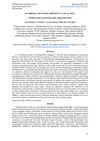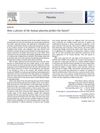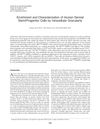 12 citations,
May 2019 in “Stem cell reviews”
12 citations,
May 2019 in “Stem cell reviews” Fetal-maternal stem cells in a mother's hair can help with tissue repair and regeneration long after childbirth.
 21 citations,
March 2018 in “Experimental Dermatology”
21 citations,
March 2018 in “Experimental Dermatology” The guide explains how to study human skin fat cells and their tissue, aiming to improve research and medical treatments.
 8 citations,
October 2022 in “Regenerative Therapy”
8 citations,
October 2022 in “Regenerative Therapy” New regenerative treatments for hair loss show promise but need more research for confirmation.
 16 citations,
February 2018 in “European Journal of Endocrinology”
16 citations,
February 2018 in “European Journal of Endocrinology” Diagnosing hyperandrogenism in women is complex and requires accurate testing methods and consideration of SHBG levels.
 April 2024 in “Journal of pharmacy & pharmacognosy research”
April 2024 in “Journal of pharmacy & pharmacognosy research” A compound from Calophyllum inophyllum L. leaf may help treat non-small cell lung cancer.
6 citations,
August 2020 in “Cell regeneration” Hair follicle stem cells are similar to bone marrow stem cells but are better for fat cell research.
 13 citations,
January 2010 in “Advances in Biochemical Engineering / Biotechnology”
13 citations,
January 2010 in “Advances in Biochemical Engineering / Biotechnology” Understanding hair biology is key to developing better treatments for hair and scalp issues.
 February 2024 in “Skin health and disease”
February 2024 in “Skin health and disease” Exosomes could improve skin and hair treatments but are limited by cost, production difficulty, and need for more research.
 October 2023 in “Frontiers in endocrinology”
October 2023 in “Frontiers in endocrinology” Effective PCOS treatments require targeting specific signaling pathways.
 December 2017 in “Revista Brasileira de Saúde Materno Infantil”
December 2017 in “Revista Brasileira de Saúde Materno Infantil” Pregnant women with Systemic Lupus Erythematosus have a higher risk of blood clotting problems.
 January 2015 in “Indian Journal of Medical Biochemistry”
January 2015 in “Indian Journal of Medical Biochemistry” Men with early balding should be checked for metabolic syndrome, as there's a link between the two.
 2 citations,
June 2022 in “Cosmoderma”
2 citations,
June 2022 in “Cosmoderma” Regenerative medicine shows promise for improving hair and skin but needs more research for standard use.
 January 2024 in “Jurnal Ilmu Kesehatan Hewan”
January 2024 in “Jurnal Ilmu Kesehatan Hewan” The dog recovered well after treatment, showing no skin issues and normal hair growth.
 1 citations,
January 2015 in “Journal of clinical and investigative dermatology”
1 citations,
January 2015 in “Journal of clinical and investigative dermatology” IGF-1 from human placenta helps hair grow.
 3 citations,
October 2010 in “Placenta”
3 citations,
October 2010 in “Placenta” The shape and size of the placenta may help predict future health risks for both mother and child.
 January 2022 in “Stem cell biology and regenerative medicine”
January 2022 in “Stem cell biology and regenerative medicine” New biofabrication technologies could lead to treatments for hair loss.
 10 citations,
January 2013 in “Stem Cells and Development”
10 citations,
January 2013 in “Stem Cells and Development” Scientists identified a unique type of human skin stem cell that could help with tissue repair.
 13 citations,
July 2016 in “BMC Complementary and Alternative Medicine”
13 citations,
July 2016 in “BMC Complementary and Alternative Medicine” Hominis Placenta helps hair grow back by increasing cell growth and a specific growth factor.
 4 citations,
May 2020 in “International Journal of Women's Dermatology”
4 citations,
May 2020 in “International Journal of Women's Dermatology” Cow placenta lotion works like minoxidil 2% for female hair loss, with fewer side effects.
 March 2024 in “Journal of pharmacopuncture”
March 2024 in “Journal of pharmacopuncture” Hominis Placenta Pharmacopunture helped regrow hair in a patient with stress-induced hair loss.
 124 citations,
September 1992 in “Endocrinology”
124 citations,
September 1992 in “Endocrinology” The human type II 5α-reductase gene, linked to certain male health conditions, has a specific structure and low similarity to other related genes.
 76 citations,
September 1992 in “Endocrinology”
76 citations,
September 1992 in “Endocrinology” The human type II 5α-reductase gene has a specific structure important for understanding certain medical conditions.
 72 citations,
October 2009 in “The FASEB journal”
72 citations,
October 2009 in “The FASEB journal” TRH stimulates human hair growth and extends the hair growth phase.
 45 citations,
September 1998 in “Journal of Investigative Dermatology”
45 citations,
September 1998 in “Journal of Investigative Dermatology” The enzyme 17β-HSD type 2 mainly performs oxidation in human sebaceous glands, which may help protect against acne.
 63 citations,
November 1999 in “British journal of dermatology/British journal of dermatology, Supplement”
63 citations,
November 1999 in “British journal of dermatology/British journal of dermatology, Supplement” Hair sensitivity to androgens is partly controlled by specific enzyme expressions in different hair areas.
102 citations,
April 2014 in “PloS one” Wharton’s Jelly stem cells from the umbilical cord improve skin healing and hair growth without scarring.
1 citations,
November 2022 in “International journal of molecular sciences” Human fetal placental stromal cell injections speed up healing and improve skin and hair recovery after radiation damage.

A woman regrew her hair after receiving injections of special cell-derived vesicles.
7 citations,
February 2009 in “Cell and tissue biology”  2 citations,
March 2020 in “bioRxiv (Cold Spring Harbor Laboratory)”
2 citations,
March 2020 in “bioRxiv (Cold Spring Harbor Laboratory)” HAIR may cause fetal loss by triggering different cell death processes in the uterus and placenta.

























